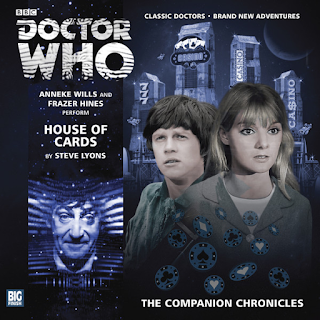 The TARDIS arrives in London in December of 1648 just after the Second English Civil War. As seasoned veterans of time travel, the Doctor, Ben and Polly know to do well to stay on the sidelines and not get involved. Jamie finds himself in his own relative past for the first time but heeds the warnings of the Doctor about getting involved, right up until events sweep the time travellers up in their wake. Ben is press-ganged into serving on a ship bound for Amsterdam. Polly is left to wander London alone. And the Doctor and Jamie become unwilling guests of Oliver Cromwell. So much for staying out of it.
The TARDIS arrives in London in December of 1648 just after the Second English Civil War. As seasoned veterans of time travel, the Doctor, Ben and Polly know to do well to stay on the sidelines and not get involved. Jamie finds himself in his own relative past for the first time but heeds the warnings of the Doctor about getting involved, right up until events sweep the time travellers up in their wake. Ben is press-ganged into serving on a ship bound for Amsterdam. Polly is left to wander London alone. And the Doctor and Jamie become unwilling guests of Oliver Cromwell. So much for staying out of it.The Roundheads was one of the first few BBC Books novels published back in 1997, when, as I have said previously, the new novel series was still finding its way and the authors who contributed to the Virgin Books line were testing the waters and playing things safe with their submissions. When I first read it back then I was not exactly thrilled with the tale, but that would mostly be due to my own personal annoyance that the Virgin books were over and it felt like Doctor Who in print was starting all over again. And the book itself does read that way a bit - despite it being set at an interesting point in history it still feels a bit simplistic in the narrative, not as... alive, if you will, as other work author Mark Gatiss penned for Doctor Who previously (and since; he has written scripts for the new series). But whether it was a case of play it safe or not, choosing a purely historical adventure over something more complex and spacey is better suited to the series era of the time, and provides an additional historical-only tale along the lines of The Highlanders.
 This time around, though, I opted for the audio book release; The Roundheads was one of several previously published BBC Novels which received an updated cover and a new printing around the show's 50th anniversary (The Witch Hunters was another) and those titles for the most part received the audiobook treatment. Roundheads benefited from having none other than Anneke Wills herself provide the narration, adapting her voice to mimic those of her past showmates Troughton, Craze and Hines, and lending an additional level of intrigue to the story. I suppose in some way I felt it legitimized the tale a bit more with an actual alumni of the series doing the reading, made it feel more like something from the era.
This time around, though, I opted for the audio book release; The Roundheads was one of several previously published BBC Novels which received an updated cover and a new printing around the show's 50th anniversary (The Witch Hunters was another) and those titles for the most part received the audiobook treatment. Roundheads benefited from having none other than Anneke Wills herself provide the narration, adapting her voice to mimic those of her past showmates Troughton, Craze and Hines, and lending an additional level of intrigue to the story. I suppose in some way I felt it legitimized the tale a bit more with an actual alumni of the series doing the reading, made it feel more like something from the era.Roundheads does have this subtle angle about Ben and Polly wondering how much longer they will stay with the Doctor; they are enjoying the time travel and all but to them it's a sort of holiday from their real lives and they will have to go back eventually. Moreover, Polly muses that the Doctor and Jamie have grown closer and that he may in fact prefer the Scots lad as company because he accepts everything the Doctor tells him and doesn't ask too many "stupid questions". Ben doesn't see it that way but at the time he is drinking at a pub, and shortly gets knocked out and dropped on a ship headed away from England. In fact, Ben and Polly find themselves operating solo for most of the story and falling into the company of people who would use them for their own needs; Ben ends up joining up with a female pirate sea captain in his efforts to get back to England and Polly is unwillingly drawn into a plot to rescue Charles I from Cromwell's forces.
The Doctor and Jamie do not get as much of an adventure; they are reluctant guests of Cromwell (read: prisoners) when the Doctor bluffs that Jamie can see the future. To aid this little ruse along the Doctor refers to a book about English history - a book he manages to lose and jeopardize the future of the world. The comedy element of Jamie and the Doctor's visionary act balances out the filth and gore which is the ordeal of Polly and Ben, but it's a bit of a disappointment that the Doctor's role in the story is not as action packed as that of his companions; this sort of thing is something more suited for the first Doctor, really, and feels like if this had been written for an earlier crew (Ian, Barbara, Vicki) the distribution of work might have felt more appropriate.
NEXT EPISODE: THE YES MEN

















